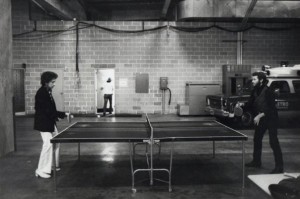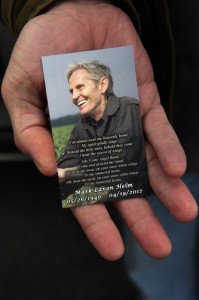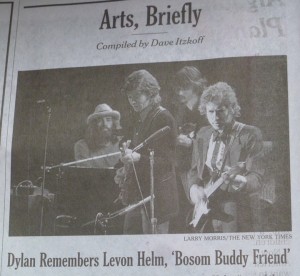 Among the pieces of journalism and commentary I’ve read about Levon Helm since word of his terminal condition was released by his family last week, and then since his death on Thursday, this one by Mark Guarino is the best yet. I recommend you read it, for it captures the injustice that accompanied The Band’s dissolution, and how Robbie Robertson and the businesspeople around him really did treat his four bandmates inequitably. According to Levon, in his memoir This Wheel’s on Fire, Robbie claimed all the publishing royalties on most of their songs, compositions that had famously been workshopped by all five of them, beginning at the Big Pink house, and in later sessions. For the sake of argument, even if Robbie believed he was genuinely responsible for most of the songwriting, why not assert a claim on a larger share of the royalties and then split the remaining percentage four ways? Instead, he just walked away with it all on most of their repertoire and by the time Levon received his cancer diagnosis in 1998, he had to declare personal bankruptcy and nearly lost his house. I know Robbie came to his bedside this week, and if Levon really reconciled with him that’s great, but it’s hard not to see Robbie’s visit as some self-serving absolution. It certainly adds to the sadness of Levon’s passing to say this, but I believe it’s true.
Among the pieces of journalism and commentary I’ve read about Levon Helm since word of his terminal condition was released by his family last week, and then since his death on Thursday, this one by Mark Guarino is the best yet. I recommend you read it, for it captures the injustice that accompanied The Band’s dissolution, and how Robbie Robertson and the businesspeople around him really did treat his four bandmates inequitably. According to Levon, in his memoir This Wheel’s on Fire, Robbie claimed all the publishing royalties on most of their songs, compositions that had famously been workshopped by all five of them, beginning at the Big Pink house, and in later sessions. For the sake of argument, even if Robbie believed he was genuinely responsible for most of the songwriting, why not assert a claim on a larger share of the royalties and then split the remaining percentage four ways? Instead, he just walked away with it all on most of their repertoire and by the time Levon received his cancer diagnosis in 1998, he had to declare personal bankruptcy and nearly lost his house. I know Robbie came to his bedside this week, and if Levon really reconciled with him that’s great, but it’s hard not to see Robbie’s visit as some self-serving absolution. It certainly adds to the sadness of Levon’s passing to say this, but I believe it’s true.
Now, as many articles have pointed out, Levon did mount a great second act with the Midnight Ramble, the Grammy-winning albums, and playing and singing with his daughter Amy. But that happiness stands in sharp contrast to the fact that nothing like that happened for Richard Manuel and Rick Danko, and this is where Guarino’s Christian Science Monitor, “Levon Helm and The Band: a rock parable of fame, betrayal, and redemption” is most valuable.
Manuel’s post-breakup troubles ended with his 1986 suicide, during a revival tour of The Band sans Robbie. Guarino tells us that Levon is the one who found him after he’d hanged himself. As for Danko, he died at fifty-one from complications of heart disease. Guarino, quoting from the memoir, reminds us of Levon’s words: “If Rick’s money wasn’t in their pockets, I don’t think Rick would have died because Rick worked himself to death.… He wasn’t that old and he wasn’t that sick. He just worked himself to death. And the reason Rick had to work all the time was because he’d been [expletive] out of his money.” To be fair, it should be admitted too that a hard-partying lifestyle would have contributed to Manuel’s and Danko’s early demise (see Danko’s stoned moments with Janis Joplin in the rolling concert film “Festival Express,” if you have any doubt how much Rick loved getting high), but it doesn’t change the fact that playing half-empty dives to keep making a living, for a musician who once played to 600,000 at Watkins Glen with the Allmans and The Dead in ’73 (which I personally attended*), had to have depressed him and Manuel to a point where continued substance abuse was, if not inevitable, unsurprising.
All this sadness acknowledged, it is comforting to see how sadness brings us all together, bridging intervening years. After posting on Facebook and Twitter over the past week, I’ve heard from high school friends, such as Seth Foldy of Friends School and hometown Cleveland pals, like Eric Broder. Eric referred me to the Drive-by-Truckers’ Danko-Manuel song, with its haunted lyrics, “Got to sinking in the place where I once stood/Now I ain’t living like I should . . . Richard Manuel is dead”.
It was fitting to me that the family’s first message about Levon’s illness, while originating with his wife and Amy (who I had the privilege of hearing sing a few months ago with Blackie and the Rodeo Kings**, a performance I wrote about here), was immediately passed along on social media by “Bob Dylan and The Band.” And then, after Levon died, this appeared on bobdylan.com: “He was my bosom buddy friend to the end, one of the last true great spirits of my or any other generation. This is just so sad to talk about. I still can remember the first day I met him and the last day I saw him. We go back pretty far and had been through some trials together. I’m going to miss him, as I’m sure a whole lot of others will too.”
In honor of The Band and Bob Dylan, and yesterday’s Record Store Day, I’ve taken photos of all my LPs and CDs coming from their great musical enterprise, even Robbie’s first solo album. (click on thumbnails for full panorama of album images
* From that great weekend, I recall that a heavy thunderstorm with distant bolts of lightning let loose on the Saturday night, and The Band, then playing, had to flee the stage out of safety concerns. When the downpour had ebbed, Garth Hudson came out first and sat at his organ beneath a protective little canopy, launching into an unforgettable rendition of the solo that opens “Chest Fever, a song on “Music From Big Pink,” “Chest Fever.” These moments are forever captured on one of the CDs photographed below, “The Band- Live at Watkins Glen.”
**From Blackie and the Rodeo Kings, Colin Linden, who knew and had played music with Levon, was interviewed by Jian Ghomeshi on the CBC Radio program ‘Q’ the day after his friend’s death, as was Garth Hudson, conversations that can be heard via this link. // see more . . . for footnotes and photos. . .
 The NY Times reports that this past Thursday more than 2,000 fans, friends, and admirers of Levon Helm flocked to Woodstock, NY, to pay tribute to the late drummer, singer, and all around good man. Levon’s family prepared the palm card shown here with his picture and dates to hand out to the sad celebrants. What struck me in this story and other accounts I’ve read are the tales of his contributions to the local community–playing on the Town Green, inviting locals to attend concerts at the Ramble free of charge, and other kindnesses. He is missed by so many.
The NY Times reports that this past Thursday more than 2,000 fans, friends, and admirers of Levon Helm flocked to Woodstock, NY, to pay tribute to the late drummer, singer, and all around good man. Levon’s family prepared the palm card shown here with his picture and dates to hand out to the sad celebrants. What struck me in this story and other accounts I’ve read are the tales of his contributions to the local community–playing on the Town Green, inviting locals to attend concerts at the Ramble free of charge, and other kindnesses. He is missed by so many.

 Among the pieces of journalism and commentary I’ve read about Levon Helm since word of his terminal condition was released by his family last week, and then since his death on Thursday,
Among the pieces of journalism and commentary I’ve read about Levon Helm since word of his terminal condition was released by his family last week, and then since his death on Thursday, 